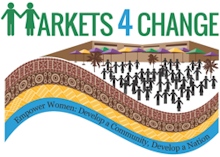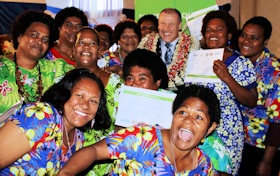Press Release: Market vendors recognised for collective organising
Date:

More than 80 market vendors from Suva and Nausori markets were recognised on Wednesday July 23 for their active participation in a series of workshops, held in April and May, aimed at helping them work together towards making positive changes to their marketplaces.

Acting Australian High Commissioner, Glenn Miles, with some of the market vendors who received their certificates from UN Women. Photo credit: UN Women
Vendors received certificates from Acting Australian High Commissioner, Glenn Miles, at a ceremony at Devos in the Park in Suva attended by stakeholders and invited guests, including Chandu Umaria and Napolioni Masirewa, special administrators from Suva and Nausori respectively.
The “Getting Started” workshops are part of UN Women’s Markets for Change (M4C) project, which is principally funded by the Australian Government. Markets for Change is a six-year initiative that works with nine municipal councils in 10 market sites across Fiji in an effort to help ensure they are safe, inclusive and non-discriminatory, promoting gender equality and women’s empowerment.
A key focus of the workshops is to form and strengthen market vendor associations, which are important avenues for vendors to engage in marketplace decision-making and ultimately to contribute to improvements to market conditions.
While associations already exist at Suva and Nausori markets, membership is low – only 145 of the estimated 1200 vendors at Suva market are members, while Nausori has 300 registered members out of a total of 500.
Despite the fact that women often constitute a majority of market vendors in the Pacific, they are often excluded from opportunities to participate in decision-making processes. Women often face a number of challenges when trying to take up leadership positions, including long-standing male office holders with established networks and relationships, as well as a perception that men are more credible leaders.
To help address some of these barriers, the “Getting Started” workshops focus on how vendors can build and maintain democratic organisations that effectively represent all their members. This includes skills sharing on recruitment, constitution strengthening, choosing the right kind of leaders, and processes to ensure men and women equally participate in decision-making.
UN Women’s Officer in Charge at the Fiji Multi-Country Office, Welder Mtisi said it was fantastic to see the enthusiasm with which market vendors have embraced the workshops and how motivated they are to work together to make changes that benefit them all.
“Markets are central to the livelihoods of a large group of Fiji’s population, especially poor households, which makes them key sites for women’s economic empowerment and national poverty reduction. Empowering women market vendors to organise and participate in marketplace governance and decision-making as a unified community will therefore have a ripple effect on their communities and the economy at large.”
Anisa Marama (77) from Wainibuku took part in the Nausori workshops and received a certificate at Wednesday’s ceremony. She thanked UN Women for helping to increase her understanding of the importance of vendors working together to decide on their priorities and take action to make positive changes.“I started selling in the market in 1960 and I am so happy to see the changes that are currently taking place to improve the lives of women market vendors. I was so naïve and innocent for 54 years, I did not know that there is a market bylaw that safeguards us vendors.”
Mr Miles congratulated the market vendors and wished them well in implementing the action plans resulting from their training.
“The toolkit that vendors have been trained in covers important topics for building a safe and democratic marketplace for vendors, such as leadership, good governance, promoting women’s participation and good financial management,” Mr Miles said. “Australia’s strong support for women’s economic empowerment is based on the premise that when women can actively participate in the economy, including the formal labour market, we all prosper.”
UN Women’s M4C project also covers a number of urban and rural markets in Vanuatu and Solomon Islands.
The “Getting Started” workshops will be rolled out to the other eight municipal markets in Fiji involved in the M4C project during 2014.
For further information please visit:
http://asiapacific.unwomen.org/en/countries/fiji
http://www.facebook.com/unwomenpacific
Media enquiries:
Ellie van Baaren
Regional communications and media specialist
UN Women
Phone: (+679) 330 1178 ext 125
Email: ellie.vanbaaren@unwomen.org
Notes to Editors:
UN Women’s Markets for Change project
UN Women’s Markets for Change project is a key component of its Women’s Economic Empowerment programme. The six-year, multi-country initiative aims to ensure that marketplaces in rural and urban areas in Fiji, Solomon Islands and Vanuatu are safe, inclusive and non-discriminatory, promoting gender equality and women’s empowerment.
Between 75% and 90% of vendors working at Pacific marketplaces are women and their earnings often make up a significant portion of the incomes of many poor households. Despite this, women are often excluded from market governance and decision-making. M4C works with stakeholders, service providers and the market vendors themselves to: build and support inclusive, effective and representative advocacy groups; deliver appropriate services, training and interventions; ensure women’s voices are heard and taken into account at the decision-making level; and to improve physical infrastructure and operating systems.
Australia’s Department of Foreign Affairs and Trade has provided AU$10 million to support the implementation of the Markets for Change project.
About UN Women and the Multi-Country Office (MCO) in Fiji
The United Nations Entity for Gender Equality and the Empowerment of Women (UN Women) was created at the July 2010 United Nations General Assembly. A global champion for women and girls, UN Women was established to accelerate progress on meeting their needs worldwide. The MCO covers 14 Pacific Island Countries and Territories (PICTs): Cook Islands, Federated States of Micronesia, Fiji, Kiribati, Nauru, Niue, Palau, Republic of Marshall Islands, Samoa, Solomon Islands, Tokelau, Tonga, Tuvalu and Vanuatu. The Fiji MCO works with four key programmes: Women’s Economic Empowerment; Ending Violence Against Women; Advancing Gender Justice in the Pacific; and Increasing Community Resilience through Empowerment of Women to Address Climate Change and Natural Hazards Programme to progress with gender equality and women’s empowerment in the Pacific.